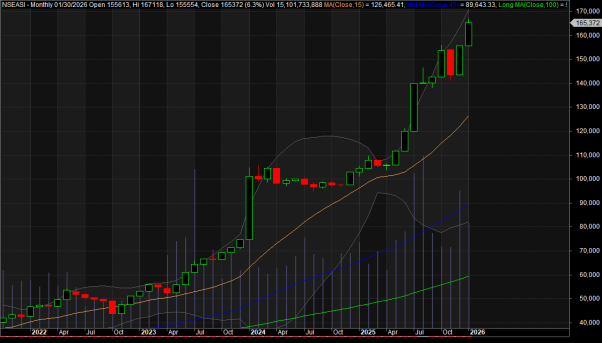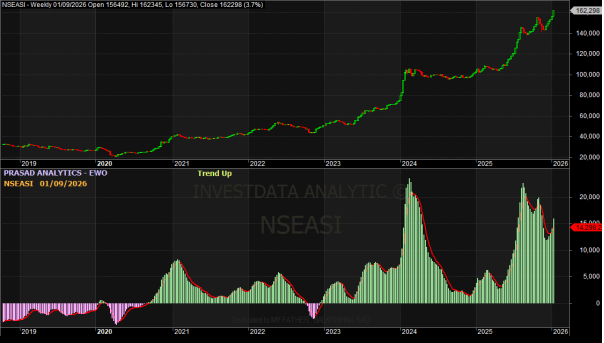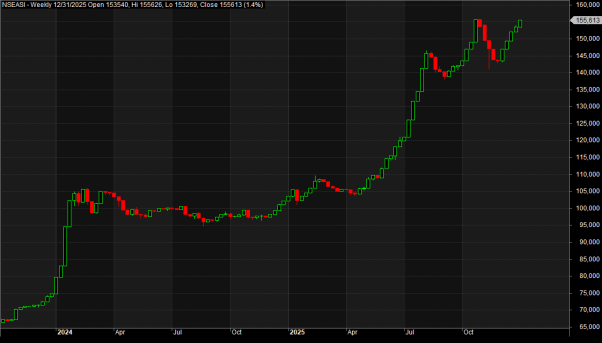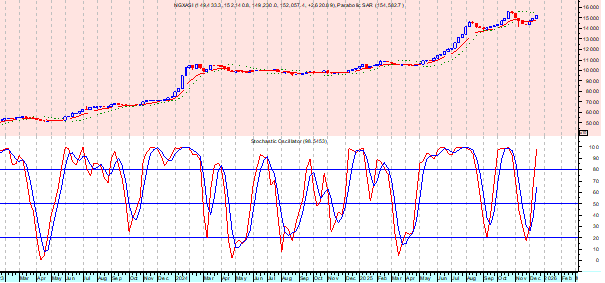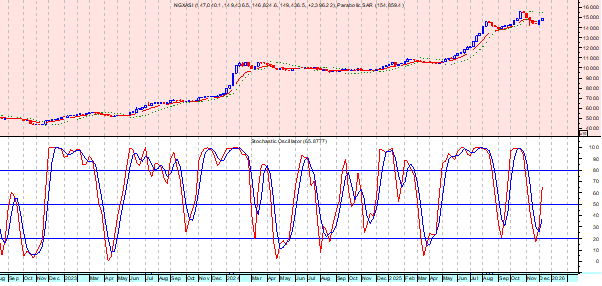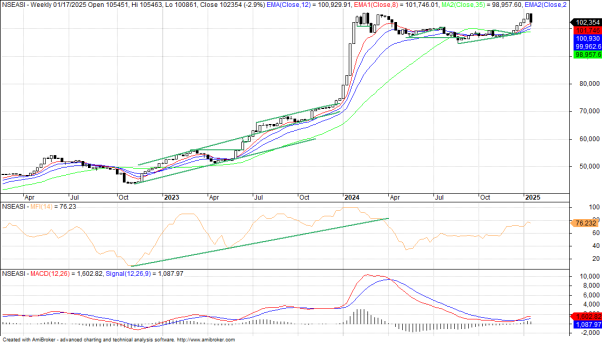
The Nigerian Exchange (NGX) witnessed a noticeable slowdown in trading activity this week, due to mixed sentiments and profit taking, with a total of 2.25bn shares worth ₦58.831bn changing hands in 63,657 deals. This represented a shortfall from previous week’s 4.698bn shares valued at ₦85.043bn exchanged in 72,562 deals, halting six successive weeks of bull transition that has been the pattern in January since 2020. This resulted from the NGX’s change in post-listing requirement which directed quoted companies to submit their quarterly and full year financials.
Technically
NGXASI Weekly Chart
No equity market maintains an uptrend indefinitely. Markets correct themselves before continuing their upward trajectory. This is akin to how humans seek rest to gain strength. Investors often sell off stocks after profiting from a sector, reallocating their positions into other sectors with stronger growth potential. This process, known as sector rotation, has a significant impact on the financial market. Market corrections should not be viewed as a trend reversal; they are simply part of the market’s natural dynamics.
The market has previously traded well above the 105,000 psychological level before correcting (a temporary decline) to 102,000 basis points. This decline is primarily due to sector rotation and a drop in large-cap stocks like Dangote Cement. However, the market remains well-funded, as indicated by a money flow reading of 64.3, reflecting strong investor confidence in the Nigerian stock market. This confidence stems from consistent positive returns over the past five years.
NGXASI Daily Chart
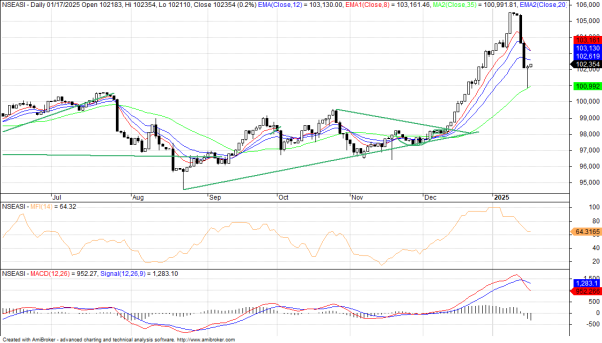
Currently, the MACD is below the signal line due to the recent market correction, but it is expected to cross above the signal line in the coming week. The Relative Strength Index (RSI) at 51.9 indicates that the market still has strong potential to continue its uptrend. Overall, the market is expected.
The bullish hammer candlestick pattern on Thursday signalled reversal underway which Friday trading revealed a strong support level and accumulation phase ahead of Q4 earnings reporting season that is likely to kick-off next week. These corporate numbers are expected to change market momentum and at the same time drive liquidity and volume that support price rally in the short to long term.
Sectoral Performance
The Financial Services sector maintained its dominance as the most active sector, leading with a volume of 1.371bn shares worth ₦22.274 billion traded in 26,114 deals, accounting for 60.86% of the total equity turnover volume and 37.86% of the total value traded.
The Consumer Goods Industry followed, recording a turnover of 253.536 million shares valued at ₦15.244 billion in 8,869 deals. In third place was the Services Industry, which saw 193.424 million shares worth ₦931.795 million traded in 4,716 deals.
NGX Banking Index Weekly Chart
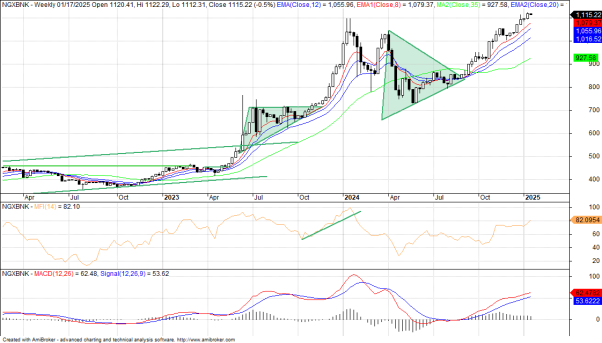
NGX Consumer Goods Index Weekly Chart
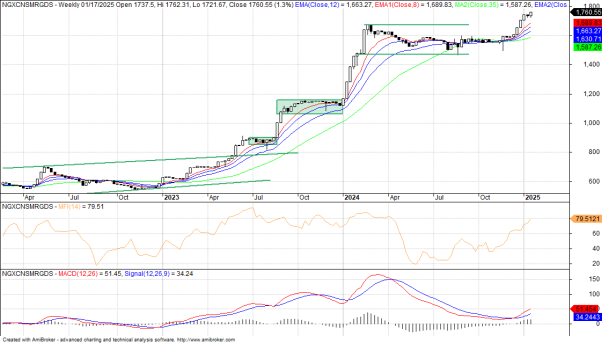
NGX Industrial Goods Weekly Chart
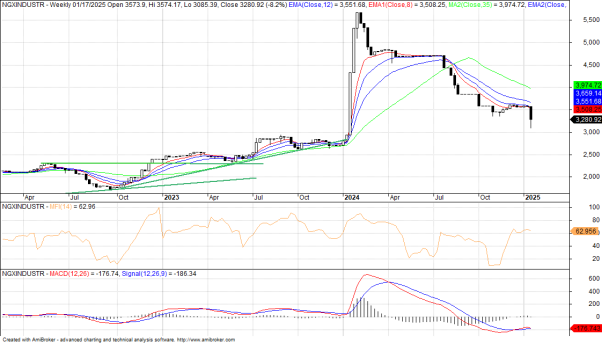
NGX Insurance Index Weekly Chart
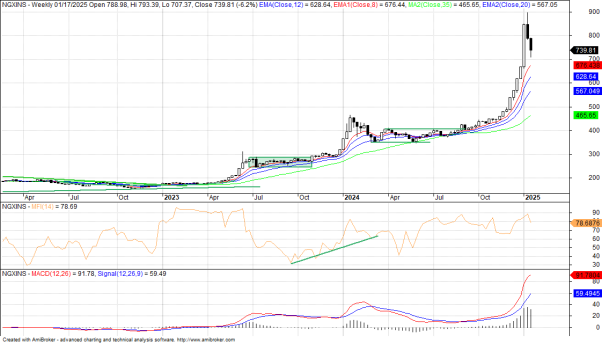
NGX Oil & Gas Index Weekly Chart
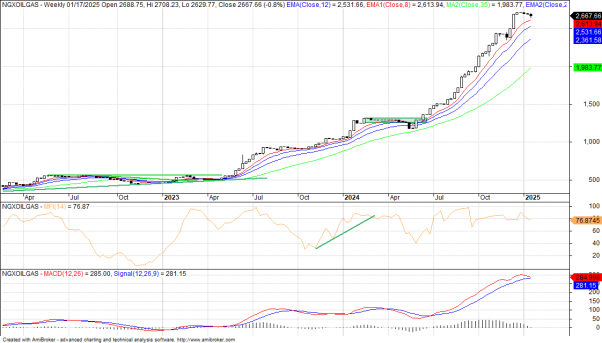
NGX 30 Index Weekly Chart
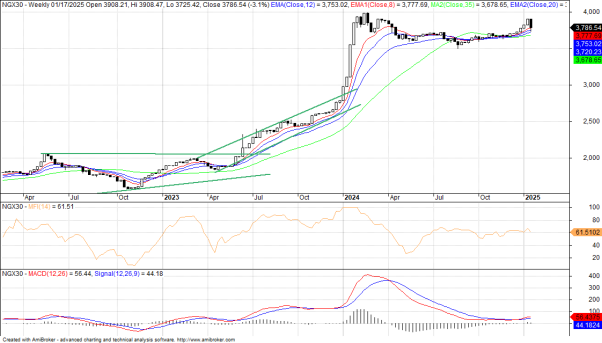
Leading Equities
Three equities stood out during the week in terms of trading volume: Universal Insurance Plc, Guaranty Trust Holding Company Plc, and AIICO Insurance Plc. Together, they accounted for 468.315m shares worth ₦9.007bn traded in 3,568 deals. These companies contributed 20.79% to the total equity turnover volume and 15.31% to the total value.
Universal Insurance Weekly Chart

GTCO Weekly Chart

Aiico Insurance Weekly Chart
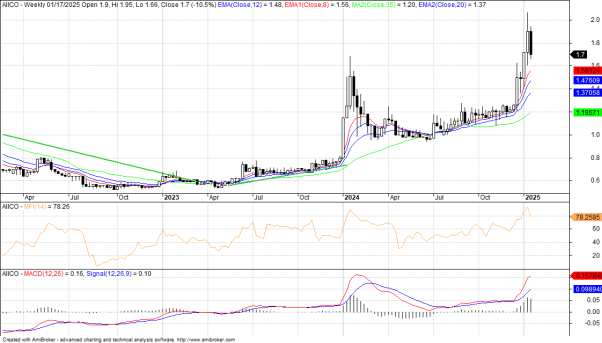
Market Indices
The NGX All-Share Index (ASI) and Market Capitalization recorded declines, closing the week, closing at 102,353.68 points and ₦62.851 trillion, representing losses of 2.94% and 2.26%, respectively.
While most indices on the Exchange ended the week in negative territory, a few bucked the trend. The NGX MERI Value Index gained 0.70%, the NGX Consumer Goods Index rose by 1.33%, the NGX Growth Index increased by 0.15%, and the NGX Sovereign Bond Index edged up by 0.04%. The NGX ASeM Index remained unchanged.
Top Gainers
Neimeth International Pharmaceuticals Plc led the week’s gainers with a significant price increase of 31.42%, closing at ₦3.43 from an opening price of ₦2.61. SCOA Nigeria Plc followed with a 20.39% rise, ending the week at ₦2.48. Northern Nigeria Flour Mills Plc recorded a 19.54% gain to close at ₦54.45, while Livestock Feeds Plc appreciated by 17.62%, closing at ₦5.94. Dangote Sugar Refinery Plc rounded off the top gainers with a 16.67% increase, closing at ₦38.50.
Neimeth Pharm Weekly Chart

Top Decliners
Universal Insurance Plc recorded the sharpest decline, dropping 19.23% to close at ₦0.63 from ₦0.78. Royal Exchange Plc followed with an 18.35% decrease, closing at ₦0.89. Regency Assurance Plc fell by 17.78% to close at ₦0.74, while Sovereign Trust Insurance Plc declined by 16.67% to ₦1.10. Dangote Cement Plc also experienced a significant drop, losing 16.46% to close at ₦400.
Dangote Cement Weekly Chart

Trending in the Economy: Nigeria’s inflation rate rose to 34.8% in December, up from 34.6% in November, driven by festive season demand and price increases in food and beverages, the National Bureau of Statistics reported. Food inflation reached 39.84%, with key contributors including yam, sweet potatoes, rice, and fish. Inflation had eased briefly in 2023 after the naira devaluations impact faded but surged again due to petrol price hikes.
The government expects inflation to drop to 15% this year, citing reduced petroleum imports which pump price of fuel continue to oscillate in the first month of 2025.
Global Market and Oil:
U.S. stocks closed higher on Friday, capping a strong week driven by optimism about the economy and Federal Reserve interest rate policy. The S&P 500 and Dow posted their best weekly gains since November, while the Nasdaq recorded its strongest performance since December. Positive data eased inflation concerns, and expectations grew for accelerated Fed rate cuts.
Major indexes saw notable gains for the week: the Dow rose 3.69%, the S&P 500 gained 2.92%, and the Nasdaq climbed 2.43%. The 10-year Treasury yield edged up but remained below its recent high. Fed officials offered mixed signals, with some indicating rate cuts could come sooner if inflation continues to decline.
Nine of 11 S&P 500 sectors rose, led by consumer discretionary stocks, while healthcare and real estate lagged. Notable stock moves included Nvidia (+3.1%), Broadcom (+3.5%), Intel (+9.25%), and Qorvo (+14.43%). Social media stocks had muted reactions to legal developments impacting TikTok.
Oil prices fell on Friday but marked a fourth straight weekly gain amid U.S. sanctions on Russian energy. Brent crude settled at $80.79 per barrel, up 1.3% for the week, while WTI closed at $77.88, up 1.7%. Concerns over disruptions caused by Yemen’s Houthi militia eased following a Gaza ceasefire deal. Meanwhile, China’s economic growth and oil demand showed mixed signals, with refinery throughput declining in 2024.







